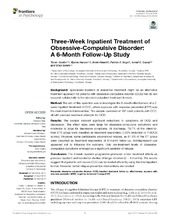| dc.contributor.author | Grøtte, Torun | |
| dc.contributor.author | Hansen, Bjarne | |
| dc.contributor.author | Haseth, Svein | |
| dc.contributor.author | Vogel, Patrick A. | |
| dc.contributor.author | Guzey, Ismail Cuneyt | |
| dc.contributor.author | Solem, Stian | |
| dc.date.accessioned | 2019-01-02T13:13:03Z | |
| dc.date.available | 2019-01-02T13:13:03Z | |
| dc.date.issued | 2018-04-30 | |
| dc.Published | Grøtte T, Hansen B, Haseth S, Vogel PA, Guzey IC, Solem S. Three-week inpatient treatment of obsessive-compulsive disorder: A six-month follow-up study. Frontiers in Psychology. 2018;9:620 | eng |
| dc.identifier.issn | 1664-1078 | |
| dc.identifier.uri | https://hdl.handle.net/1956/18811 | |
| dc.description.abstract | Background: Specialized inpatient or residential treatment might be an alternative treatment approach for patients with obsessive-compulsive disorder (OCD) that do not respond satisfactorily to the standard outpatient treatment formats. Method: The aim of this open trial was to investigate the 6-month effectiveness of a 3-week inpatient treatment of OCD, where exposure with response prevention (ERP) was the main treatment intervention. The sample consisted of 187 adult patients with OCD, all with previous treatment attempts for OCD. Results: The sample showed significant reductions in symptoms of OCD and depression. The effect sizes were large for obsessive-compulsive symptoms and moderate to large for depressive symptoms. At discharge, 79.7% of the intent-to-treat (ITT) group were classified as treatment responders (≥35% reduction in Y-BOCS scores). However, some participants experienced relapse, as 61.5% of the ITT group were classified as treatment responders at 6-month follow-up. Antidepressant use appeared not to influence the outcome. Only pre-treatment levels of obsessive-compulsive symptoms emerged as a significant predictor of relapse. Conclusion: The 3-week inpatient programme produced similar treatment effects as previous inpatient and residential studies of longer duration (2 – 3 months). The results suggest that patients with severe OCD can be treated efficiently using this brief inpatient format. However, better relapse prevention interventions are needed. | en_US |
| dc.language.iso | eng | eng |
| dc.publisher | Frontiers | eng |
| dc.rights | Attribution CC BY | eng |
| dc.rights.uri | http://creativecommons.org/licenses/by/4.0 | eng |
| dc.subject | obsessive-compulsive disorder (OCD) | eng |
| dc.subject | inpatient treatment | eng |
| dc.subject | follow-up | eng |
| dc.subject | effectiveness | eng |
| dc.subject | exposure with response prevention (ERP) | eng |
| dc.subject | cognitive-behavioral therapy (CBT) | eng |
| dc.title | Three-week inpatient treatment of obsessive-compulsive disorder: A six-month follow-up study | eng |
| dc.type | Peer reviewed | |
| dc.type | Journal article | |
| dc.date.updated | 2018-06-06T11:51:26Z | |
| dc.description.version | publishedVersion | |
| dc.rights.holder | Copyright 2018 The Author(s) | eng |
| dc.identifier.doi | https://doi.org/10.3389/fpsyg.2018.00620 | |
| dc.identifier.cristin | 1581259 | |
| dc.source.journal | Frontiers in Psychology | |

